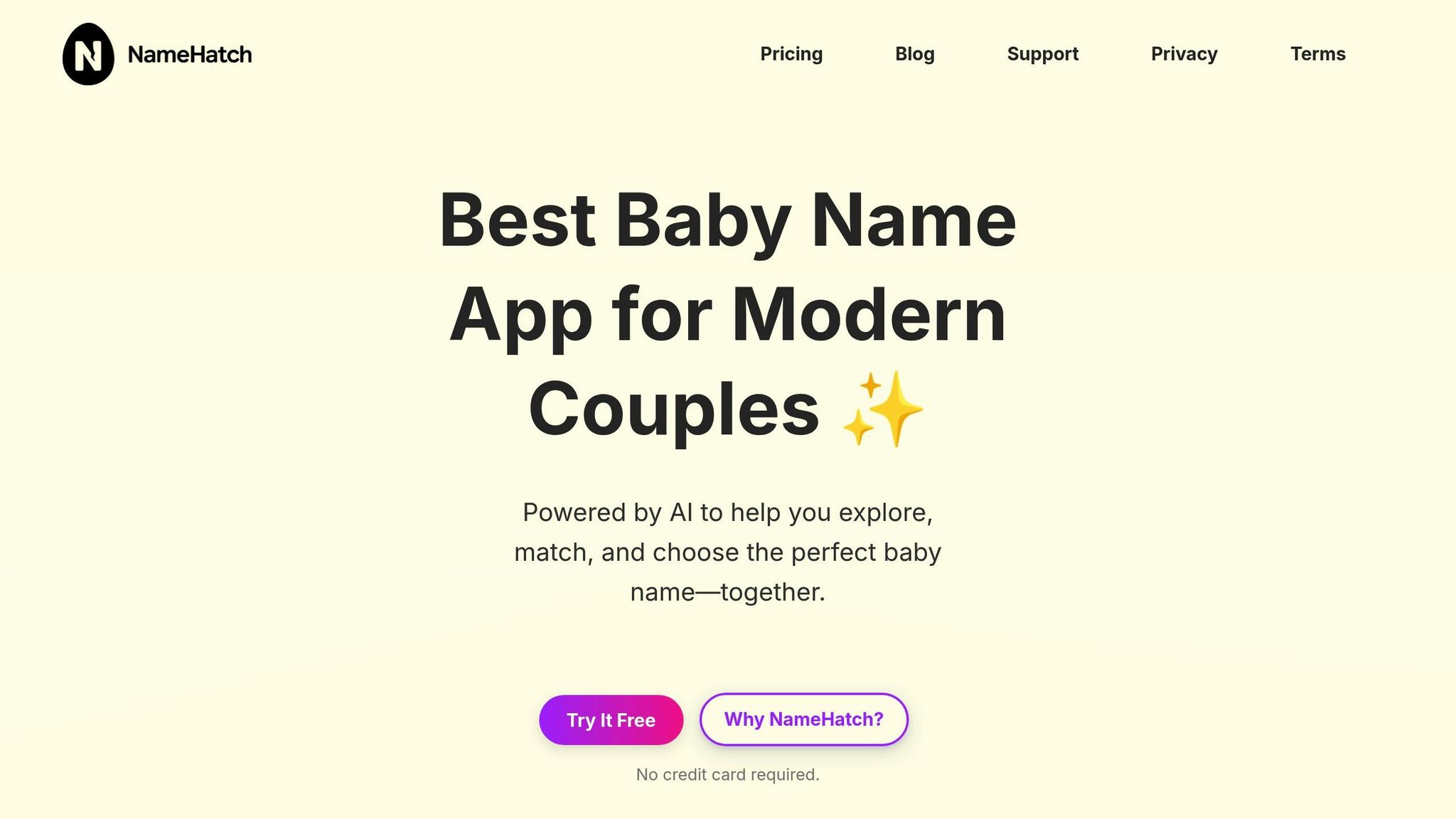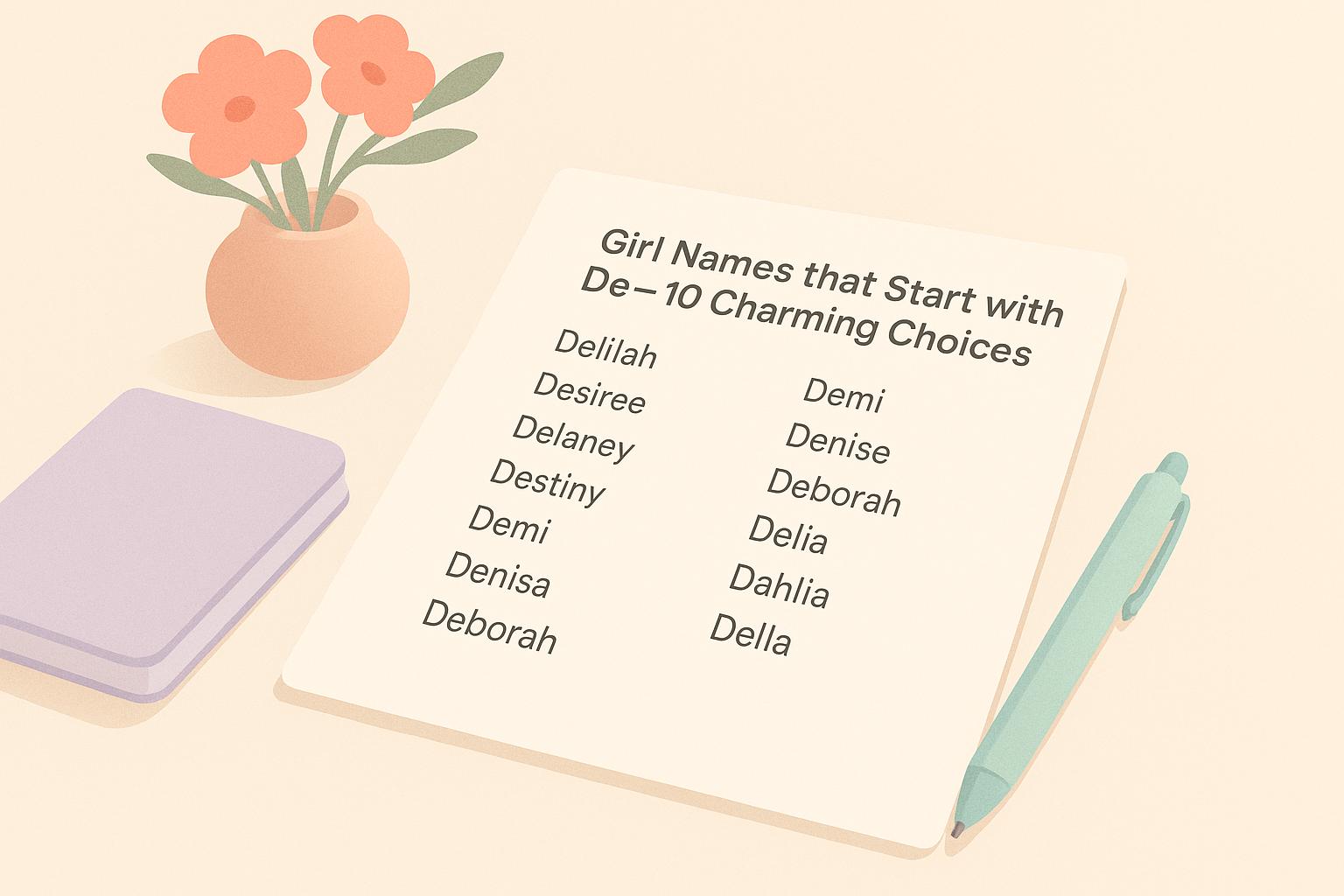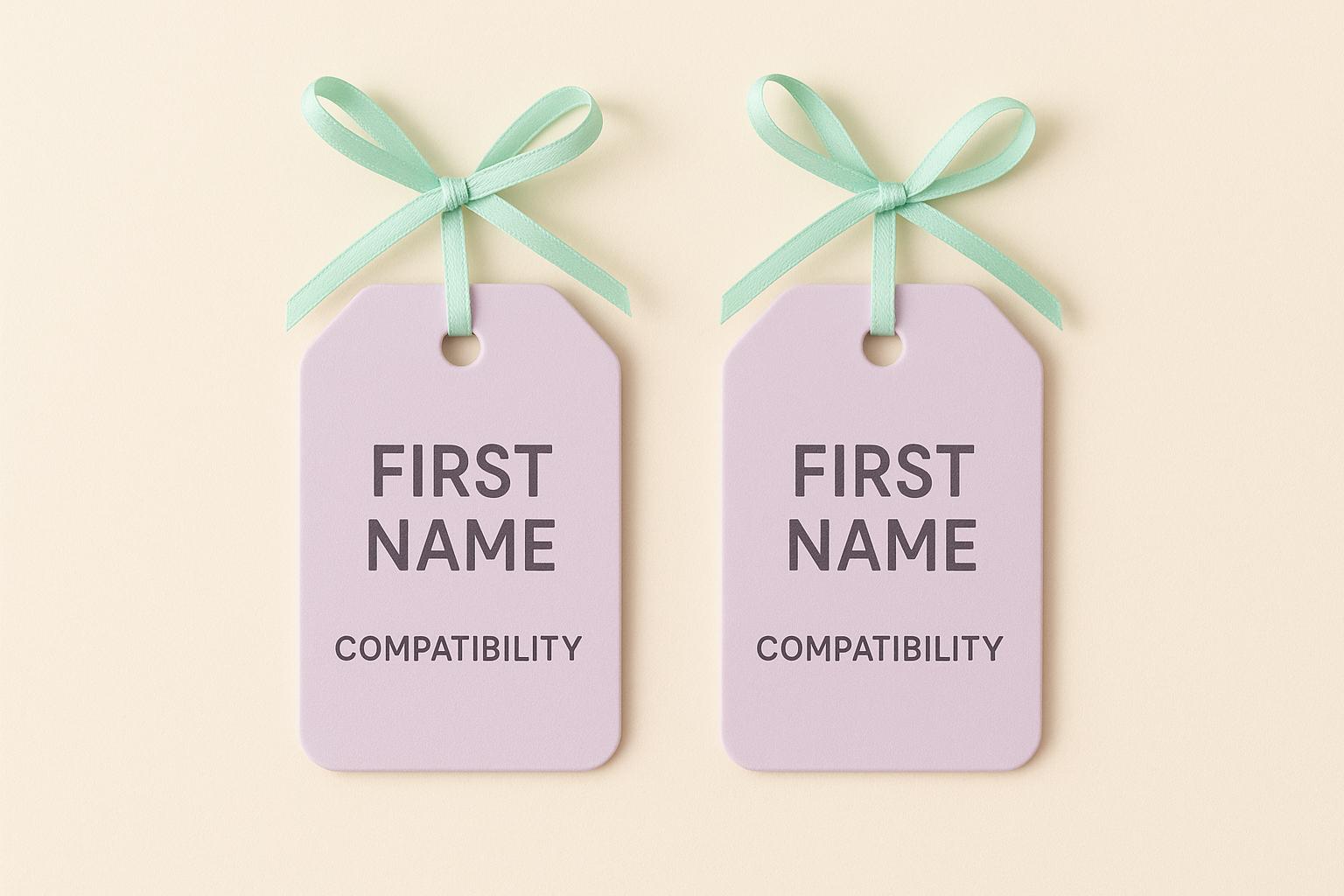Choosing a baby name can be a surprisingly stressful process for many couples. Disagreements often arise due to different tastes, family traditions, or priorities for what makes a "perfect" name. The good news? There are practical ways to make the process smoother and even enjoyable. Here are eight strategies to help you and your partner find common ground:
- Create a shared list: Combine ideas without judgment and look for overlapping favorites.
- Set rules upfront: Agree on criteria like style, length, or cultural significance.
- Use filters: Narrow down options with tools that match your preferences.
- Take turns suggesting names: Ensure both partners contribute equally.
- Try AI suggestions: Let technology introduce new ideas based on your preferences.
- Make it fun with swipe-based tools: Browse names in a lighthearted way.
- Save and revisit favorites: Give yourselves time to reflect on options.
- Use partner-matching features: Focus on names you both like.
Modern tools like NameHatch simplify the process with features like AI-powered suggestions, swipe-based discovery, and partner-matching alerts. These approaches help reduce stress and make naming your baby a collaborative and meaningful experience.
Tips for Choosing a Baby Name That You Won’t Hate Later
Why Couples Disagree on Baby Names
Choosing a baby name is a deeply personal and emotional decision for parents, but it’s also one that can lead to disagreements. Understanding the reasons behind these conflicts can help couples navigate the process and find common ground.
Different Personal Taste and Style
Parents often have contrasting preferences when it comes to baby names. Some lean toward timeless classics like William or Elizabeth, while others are drawn to modern names or unique spellings. For many Millennial and Gen Z parents, the desire to choose a name that stands out is particularly strong. As Michelle Casey, founder of Grow Little Wildflower, puts it:
"The pressure for parents to find a unique name that also isn't too 'out there' yet still sounds familiar is huge."
This shift reflects the digital age, where having a memorable name can be seen as an advantage. SJ Strum, host of the podcast Baby Name Envy, explains:
"Before, parents would pick a sensible baby name that would be 'taken seriously on a CV' to set their child up for success. Now, your Instagram is your business card, and being discoverable with a memorable name is the new way of setting them up to succeed in a digital world."
Personal experiences also shape preferences. A negative association with a particular name can trigger strong feelings, making it difficult for couples to agree. Add to this the influence of family traditions, and the decision becomes even more complex.
Family Background and Naming Customs
Family traditions and cultural practices often play a big role in naming decisions, and they can create additional tension. Generational differences in name preferences are a common source of conflict. Baby name consultant Sherri Suzanne observes:
"Rather than arguing over namesakes, the greatest conflicts I find come from generational differences in name styles."
Religious and cultural traditions also influence naming choices. For example, some Jewish families choose names that share the first initial with a recently deceased relative, while Hindu families might select names based on the child’s solar sign. In some European families, certain names are reserved for first-born children.
Extended family expectations can add even more stress. As Suzanne explains:
"Grandparents sometimes find it difficult when they realize they have less influence over their adult children's decisions; adult children sometimes find it difficult when they realize they have to move forward without the approval of their parents."
Interfaith couples often face additional challenges as they try to balance differing religious naming practices. These family and cultural influences, combined with personal preferences, can make it hard for couples to align on a name.
Different Priorities for Name Features
Another common source of disagreement is the qualities each partner values in a name. One might prioritize a name with deep meaning or a connection to family values, while the other focuses on practical considerations like how the name sounds or how easy it is to pronounce. Dr. Mitchel Newberry from the University of Michigan explains:
"For words, there's pressure to conform, but my work shows that the diversity of names results from pressures against conformity."
As societal norms evolve, parents are increasingly drawing inspiration from global naming trends and celebrating individuality over tradition. SJ Strum highlights this shift:
"Parents used to worry kids would be bullied if they stood out, but the huge shift in celebrating our differences and what makes us individuals has shrugged off that old fear."
These differing priorities often lead to long debates, with couples sometimes spending months trying to settle on the perfect name. Understanding these dynamics is the first step toward finding a solution that works for both partners.
8 Solutions to Resolve Baby Naming Disagreements
When couples face challenges in agreeing on a baby name, the secret lies in working together systematically rather than waiting for inspiration to strike. These eight practical strategies can help turn disagreements into a collaborative and enjoyable process.
1. Make a Joint List and Share Favorites
Start by creating a shared list where both partners can freely add names they like. This approach takes the pressure off immediate judgment and allows both of you to contribute openly. Combining your lists and identifying overlapping favorites is a great way to kick off the process.
Using tools like NameHatch, you can link accounts to easily compare lists and find common ground. It’s especially convenient for busy couples, enabling you to browse and add names whenever you have a spare moment.
2. Set Clear Rules Together
Before diving into name suggestions, sit down and agree on a few ground rules. This helps streamline the process by eliminating names that don’t align with your shared preferences. Guidelines might include factors like name length, origin, or style.
For instance, you could decide to avoid names of ex-partners, focus on names that flow well with your last name, or prioritize those that are easy to spell and pronounce. Agreeing on rules together keeps discussions focused on names that meet your mutual expectations.
3. Use Smart Filters to Narrow Down Options
Instead of endlessly scrolling through name lists, use filtering tools to refine your search. NameHatch offers filters like Classic, Modern, Soft, and Strong, along with premium options like Nature-Inspired, Global, Mythical, and Unique names.
Filters allow you to focus only on names that align with your agreed criteria. For example, if you’ve decided on a traditional name, you can exclude others and zero in on the right fit. Filtering by gender, origin, or style simplifies the process and makes decisions more manageable.
This method is particularly helpful when one partner prefers seeing all options, while the other likes narrowing things down to a smaller pool.
4. Take Turns Suggesting Names
To ensure fairness and prevent one partner from dominating the process, take turns suggesting names. Agree on a set number of names per session - three to five, for instance - and explain what you like about each one.
When it’s your partner’s turn, listen with an open mind, even if the suggestions don’t initially resonate with you. This turn-based approach ensures both voices are heard and valued.
5. Use AI-Powered Suggestions for Ideas
If brainstorming hits a wall, let technology lend a hand. AI tools can introduce names you might not have considered, offering fresh perspectives based on your preferences. AI tools analyze your likes and suggest names that match your style while introducing new possibilities.
For example, NameHatch’s AI takes into account factors such as your preferred style, sibling names, and previously liked options. However, as Jennifer Moss, founder of BabyNames.com, notes:
"Think of it as a thoughtful sounding board rather than a decision-maker - ultimately, the final choice is yours."
Use these suggestions as conversation starters to spark new ideas.
6. Try Swipe-Based Discovery for a Fun Experience
Turn name selection into an enjoyable activity with swipe-based discovery. This method presents names in a fun, intuitive format that many couples find more engaging than traditional name books.
With NameHatch’s swipe interface, you can quickly browse names - swiping right for those you like and left for those you don’t. This encourages independent decision-making while keeping the process lighthearted.
7. Save and Revisit Favorites Over Time
Saving your favorite names and revisiting them periodically can provide valuable perspective. Over time, you might find that some names lose their appeal, while others grow on you as you imagine them in real-life scenarios.
NameHatch allows you to save unlimited favorites with a premium plan, making it easy to build a curated list over time. Reviewing these names together can reveal how your preferences evolve throughout the journey.
8. Use Partner Matching Features to Find Overlap
Finding common ground is often the quickest way to resolve disagreements. Partner matching features can automate this process, highlighting names that both of you like. These tools create a list of mutually agreeable names, reducing the need for lengthy discussions.
With NameHatch’s partner matching, you’ll receive alerts when both of you like the same name. This simplifies the process and might reveal unexpected options you hadn’t considered. It’s an efficient way to curate a shortlist of names you both love.
How NameHatch Makes Naming Easier

NameHatch takes the stress out of choosing baby names by turning it into a collaborative and enjoyable experience for couples. It tackles the common issue of partners disagreeing on names with features designed to smooth over those conflicts. Here's how it transforms the naming process into something seamless and cooperative.
AI-Powered Personalized Suggestions
NameHatch's AI is built to bridge the gap between differing tastes. It learns from both partners' preferences and uses that information to suggest names tailored to your unique style. By analyzing patterns in decision-making, emotional responses, and linguistic details, the AI generates suggestions that feel personal and meaningful.
You can provide specifics like family traditions, cultural backgrounds, or even favorite words, and the system incorporates these nuances into its recommendations. Plus, as you swipe through names and indicate what you like or dislike, the AI adjusts its suggestions to better align with your evolving preferences. Want more control? You can fine-tune the results by setting criteria like starting letters, name length, origin, or meaning.
Swipe-Based Discovery and Smart Filters
The swipe-based interface makes browsing names feel effortless. It's not just fun - it’s also revealing. As you swipe, you uncover your true preferences, and the platform’s smart filters help narrow down the options without overwhelming you.
You can explore at your own pace - whether during a quick coffee break or a longer session. Basic filters include styles like Classic, Modern, Soft, and Strong. For those who want even more variety, premium filters unlock categories such as Nature-Inspired, Global, Mythical, and Unique. This balance ensures you can focus on your preferred style while still stumbling upon unexpected gems.
Partner Matching and Real-Time Alerts
The partner matching feature is a game-changer for couples. Invite your partner to join the app, and NameHatch keeps track of both your preferences separately. When a name matches both of your tastes, the system sends real-time alerts.
The app allows each partner to explore independently while ensuring the final decision feels organic. When a mutual favorite is found, it’s less about compromise and more about discovering a name you both genuinely love.
sbb-itb-f13f980
Old vs. New Naming Methods
Over the years, the way couples choose baby names has shifted dramatically. What used to be a process rooted in family traditions and baby name books has transformed into a tech-savvy experience that caters to modern-day needs. This shift has made the naming process faster, easier, and less stressful.
Comparison of Naming Approaches
Traditional methods feel clunky compared to the streamlined efficiency of AI-powered tools, which can quickly pinpoint names that resonate with both parents.
| Aspect | Traditional Methods | AI-Powered Approach |
|---|---|---|
| Research Process | Flipping through baby name books, family trees, and religious texts | AI scans thousands of names instantly based on personalized criteria |
| Time Investment | Hours or even days spent compiling lists | Just minutes to get tailored suggestions with smart filters |
| Partner Coordination | Individual brainstorming with occasional sharing | Real-time matching with instant notifications when both partners like the same name |
| Name Discovery | Limited by personal knowledge and available resources | Access to a global database with diverse meanings and origins |
| Decision Making | Often involves compromises or one partner giving in | Data-backed suggestions that minimize personal biases |
| Handling Disagreements | Prolonged discussions and potential conflicts | Swipe-based discovery that highlights mutual preferences naturally |
This comparison underscores how AI-driven tools not only save time but also make the naming process smoother and more collaborative. The traditional approach often resulted in more conventional name choices, while today's parents lean toward finding something unique. AI tools excel at surfacing fresh, meaningful options that both partners can agree on, eliminating the need for endless debates.
Platforms like NameHatch even generate original ideas by blending insights from various languages, cultures, and name origins - something manual research can't easily accomplish.
Perhaps most importantly, modern AI tools reduce the emotional stress of the process. Instead of being bogged down by family expectations or overwhelmed by too many options, couples can focus on what truly matters: choosing a name that feels perfect for their family. By balancing input from both parents and cutting through potential conflicts, these tools address the strain that naming disagreements can bring, as discussed earlier in this article.
Conclusion: Finding Agreement in Baby Naming
Choosing a baby name doesn’t have to be a source of stress or endless debates. By using a thoughtful and structured approach, couples can shift their focus from disagreements to shared values and preferences, making the process more enjoyable and meaningful.
Traditional methods of picking names often leave couples stuck in a cycle of indecision or conflict. Tools like NameHatch offer a refreshing alternative. It automatically aligns both partners' tastes, sending real-time alerts when there's a match, turning what could be a frustrating experience into an exciting journey of discovery.
This process also encourages couples to reflect on what matters most to them - whether that’s honoring family traditions, celebrating modern trends, or finding a name that feels entirely new. Clear criteria help cut through the overwhelming number of options, making it easier to focus on names that truly resonate.
For those struggling to find common ground, NameHatch provides a much-needed reset. Its user-friendly design allows couples to explore thousands of names with ease, while smart filters ensure the choices align with what each partner values most.
FAQs
How can NameHatch help parents agree on a baby name?
NameHatch leverages AI technology to simplify the often tricky task of choosing a baby name. By taking into account each parent's preferences, it generates tailored name suggestions that reflect both styles. This thoughtful approach helps streamline the decision-making process and brings parents closer to a mutual choice.
The app also offers handy tools like saving and matching, making it easy to spot shared favorites. With NameHatch, what could be a stressful debate transforms into an enjoyable and collaborative experience, turning the search for the perfect baby name into a memorable journey.
How can we honor family traditions while keeping our baby's name modern and unique?
Balancing family traditions with modern naming trends can be a rewarding way to honor your roots while embracing contemporary styles. One option is to use a traditional family name as a middle name, pairing it with a more modern or trendy first name for a mix that feels both meaningful and fresh.
You could also consider modernized versions or variations of family names. For example, you might use a shorter form, a nickname, or an updated spelling to give a classic name a more current vibe.
Another approach is to look to names that reflect your heritage or cultural background, tweaking them slightly to align with today’s naming trends. This allows you to celebrate your family’s history while giving the name a modern edge. The goal is to create a name that feels personal, timeless, and perfectly suited to your family’s story.
How do partner-matching features in NameHatch help couples choose a baby name together?
Partner-Matching Features in NameHatch
NameHatch turns the often tricky task of choosing a baby name into an enjoyable, collaborative experience. The app allows both partners to connect and swipe through name options separately. Whenever both partners "like" the same name, it’s instantly saved as a match for you to revisit later.
This clever setup ensures that both individuals’ preferences are taken into account. By streamlining the decision-making process, it boosts the odds of landing on a name you both truly love!



